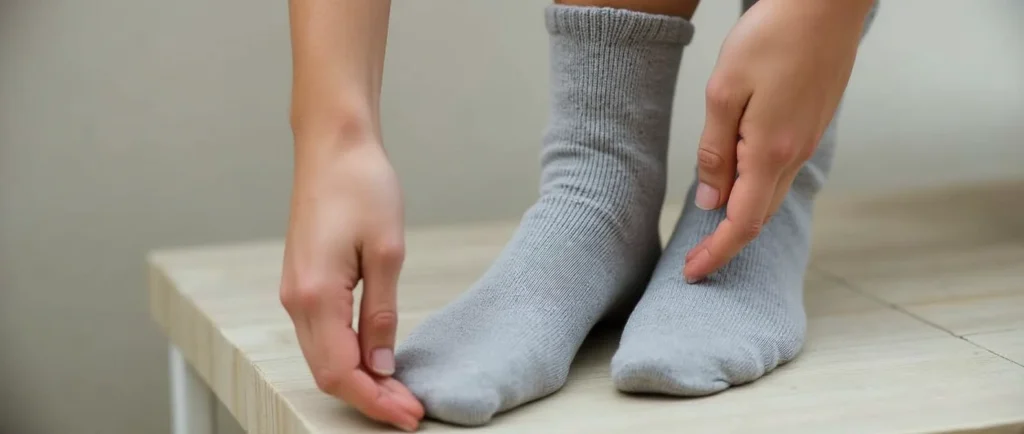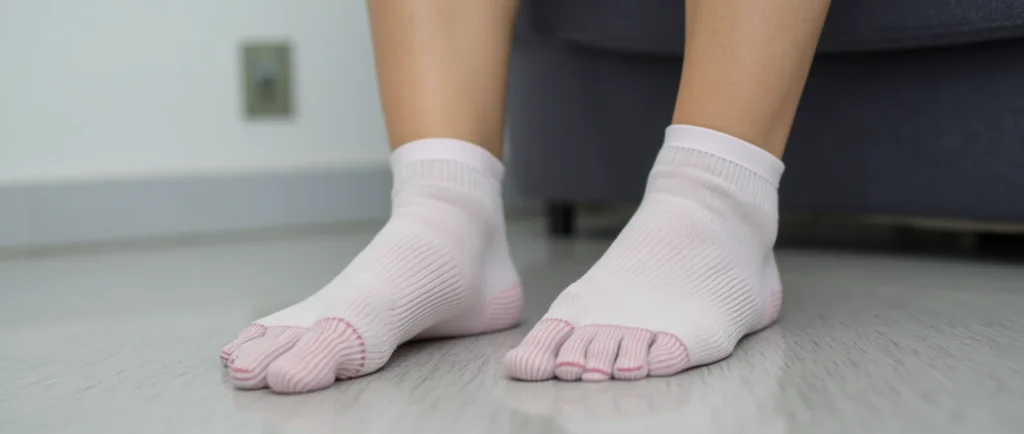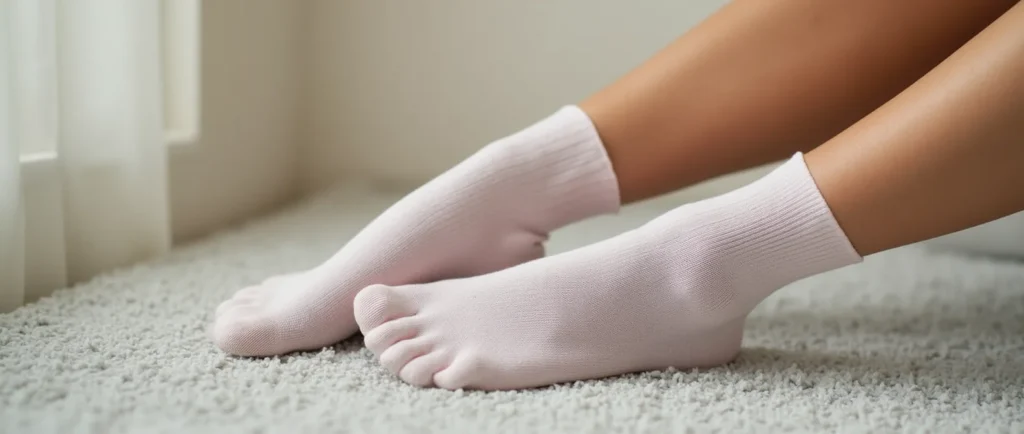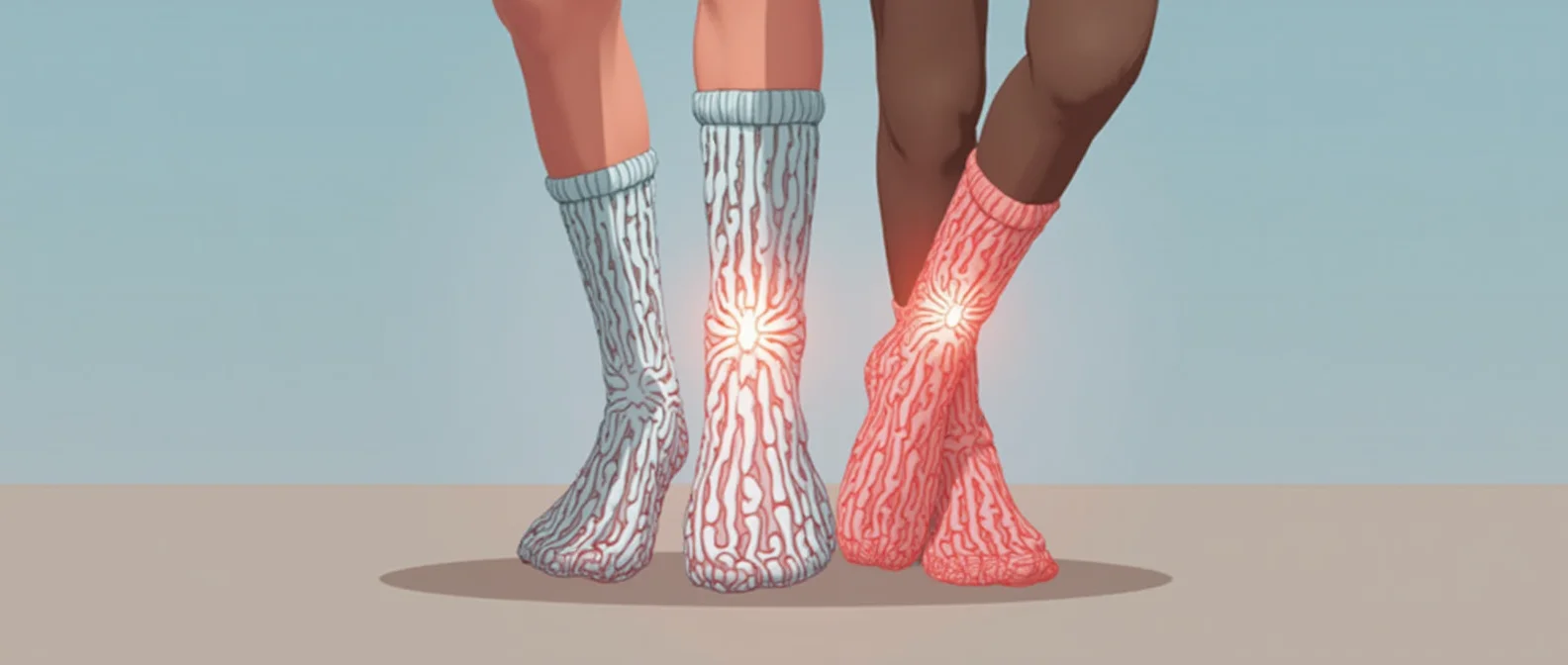Neuropathy is a common yet often misunderstood condition that affects millions of people worldwide. The pain, numbness, and discomfort that come with it can significantly affect your daily life. If you’ve been searching for relief from these symptoms, you might have come across compression socks as a potential solution. But does compression socks help neuropathy, and if so, how?
In this article, we’ll dive deep into neuropathy and explore how compression socks could be an effective tool for managing its symptoms. By the end of this article, you’ll have a clear understanding of whether compression socks could be the relief you’ve been seeking.
Table of Contents
What is Neuropathy and How Does It Affect You?
Neuropathy, often referred to as peripheral neuropathy, is a condition that involves damage to the nerves outside the brain and spinal cord. The peripheral nervous system is responsible for transmitting signals between your body and brain, and when it’s damaged, it can result in a variety of symptoms, including:
- Pain: A sharp, burning, or shooting sensation, often worse at night.
- Numbness: A loss of feeling in the hands, feet, or other extremities.
- Tingling or “Pins and Needles”: Often felt in the feet or hands.
- Weakness: Muscle weakness in affected areas.
The causes of neuropathy can vary, with diabetes being one of the most common culprits. Other causes include alcohol abuse, infections, autoimmune diseases, and even certain medications, such as those used in chemotherapy.
The impact of neuropathy on your daily life can be profound. The discomfort from constant pain and tingling, combined with the potential for weakness and numbness, can make even the simplest tasks feel like a challenge. As a result, finding ways to manage or relieve the symptoms becomes crucial.

How Compression Socks Work: A Quick Overview
Compression socks are specially designed to apply pressure to your legs, which in turn improves blood flow. This gentle pressure can reduce swelling, support the veins, and even help to relieve pain in some cases. Compression therapy has long been used to treat conditions such as varicose veins, deep vein thrombosis (DVT), and swelling. But can compression socks have an impact on neuropathy symptoms? Let’s explore.
Compression socks work by applying graduated pressure to the legs. This means that the pressure is greatest at the ankle and gradually decreases as it moves up the leg. This helps to push blood back up toward the heart and ensures that the blood doesn’t pool in the lower legs or feet. The increase in blood flow can also help reduce swelling, which is often a symptom of neuropathy.
does compression socks help neuropathy?
Now, the question you might be asking is, Do compression socks really help with? While the answer isn’t entirely clear-cut, there are certainly reasons to believe that compression socks could help alleviate some of the symptoms associated with neuropathy.
- Improved Circulation: One of the primary benefits of compression socks is improved circulation. Neuropathy, especially in people with diabetes, is often linked to poor blood circulation in the extremities. By enhancing blood flow to the legs and feet, compression socks may help deliver more oxygen and nutrients to the nerves, which could reduce pain and discomfort.
- Swelling Reduction: Many people with neuropathy experience swelling in their feet and legs. Compression socks can help to reduce this swelling by promoting better blood circulation. Less swelling could mean less pressure on the nerves, which can lead to a decrease in pain and numbness.
- Reduced Numbness and Tingling: Compression therapy can help to relieve some of the tingling or “pins and needles” sensations that are common in neuropathy sufferers. By enhancing circulation and providing gentle pressure to the affected areas, compression socks may help mitigate these uncomfortable sensations.
However, it’s important to note that compression socks are not a cure for neuropathy. They are most effective at managing symptoms, especially if poor circulation or swelling is a significant issue. They should be considered part of a broader strategy to manage neuropathy, which could include medications, lifestyle changes, or physical therapy.

Benefits of Compression Socks for Neuropathy Relief
Compression socks are more than just a tool for improving circulation—they can provide several other benefits that may help alleviate neuropathy symptoms. Here’s a breakdown of how they could be beneficial for you:
- Improved Circulation: Compression socks apply gentle pressure that pushes blood back toward your heart, reducing the likelihood of blood pooling in your feet and legs. Better circulation means more oxygen and nutrients are delivered to the nerves, potentially reducing discomfort and pain associated with neuropathy.
- Swelling Reduction: Compression socks are particularly effective at reducing swelling in the legs and feet, which is a common problem for those with neuropathy. Swelling can aggravate nerve pain, so by minimizing swelling, compression socks can provide some relief.
- Pain Relief: Many people report feeling less pain when they use compression socks regularly. The socks help to support the muscles and tissues in your legs and feet, which can reduce pressure on the nerves and ease pain.
- Enhanced Mobility: Reduced pain and swelling can make it easier to move around, allowing you to participate in daily activities more comfortably.
Potential Drawbacks and Considerations
While compression socks can offer relief for many people, they may not be suitable for everyone. There are some important considerations to keep in mind:
- Not Suitable for Everyone: Compression socks are not recommended for people with certain conditions, such as severe arterial disease or deep vein thrombosis (DVT). If you have any circulatory problems or other health issues, it’s crucial to consult with your healthcare provider before using compression socks.
- Discomfort from Poor Fit: If compression socks are too tight, they could actually make your symptoms worse. It’s important to choose socks that are the right size and provide the appropriate level of compression.
- Temporary Relief: Compression-socks are not a cure for neuropathy; they only offer temporary relief. You should continue to explore other treatment options in conjunction with compression therapy.

How to Choose the Right Compression Socks for Neuropathy
When choosing compression socks, there are a few factors to consider to ensure you get the most benefit:
- Compression Level: Compression-socks come in various pressure levels, typically ranging from mild (8-15 mmHg) to high (30-40 mmHg). For neuropathy, a moderate compression level (15-20 mmHg) is usually recommended. However, you should consult with your doctor to determine the right level for your specific needs.
- Material: Compression-socks are made from different materials, including spandex, nylon, and cotton blends. Look for breathable, moisture-wicking fabrics to ensure comfort, especially if you plan to wear them for extended periods.
- Fit: Make sure the socks fit snugly but aren’t too tight. If they’re too tight, they could interfere with circulation rather than helping it.
Step-by-Step Guide to Using Compression-Socks for Neuropathy Relief
If you’re ready to give compression-socks a try, here’s a step-by-step guide to help you get started:
- Measure Your Legs: To ensure you’re getting the right fit, measure the circumference of your calves and ankles. Use these measurements to choose socks in the appropriate size.
- Choose the Right Compression Level: Based on your doctor’s recommendation, choose the compression level that’s best for you. Most people with neuropathy will benefit from a moderate level of compression.
- Wear Consistently: For the best results, wear your compression-socks consistently. Start with a few hours per day and gradually increase wear time as your body adjusts.
- Monitor Symptoms: Pay attention to how your symptoms change while wearing compression-socks. If you notice any discomfort or worsening symptoms, consult with your healthcare provider.
Can Compression Socks Be Used in Conjunction with Other Treatments?
Compression-socks can be an effective part of your neuropathy management strategy, but they work best when combined with other treatments. Depending on your specific condition, you may benefit from physical therapy, medications, lifestyle changes, or even dietary adjustments. Always consult with your doctor to create a comprehensive treatment plan.
Expert Opinions: What Do Healthcare Providers Say About Compression Socks for Neuropathy?
Experts generally agree that compression-socks can be helpful for people with neuropathy, particularly when poor circulation or swelling is a concern. However, most doctors recommend using them in combination with other treatments for the best results. Your healthcare provider can guide you on whether compression therapy is right for you and help you find the most appropriate type of sock for your needs.
Frequently Asked Questions (FAQ)
Q1: Does wearing compression-socks help reduce neuropathy pain?
Yes, compression-socks can help reduce neuropathy pain by improving circulation, reducing swelling, and providing support to the legs and feet.
Q2: Can compression-socks prevent the progression of neuropathy?
Compression-socks are not a cure for neuropathy, but they can help manage symptoms and improve quality of life. They do not prevent the progression of the condition itself.
Q3: How long should I wear compression socks for neuropathy relief?
It’s recommended to wear compression-socks for a few hours each day, gradually increasing wear time. Start with shorter periods and listen to your body.
Q4: Are compression socks safe for everyone with neuropathy?
Compression-socks are generally safe for most people, but those with certain circulatory conditions should consult with their healthcare provider before using them.
Conclusion
Compression-socks can be a valuable tool for managing the symptoms of neuropathy. By improving circulation, reducing swelling, and alleviating pain, they offer a non-invasive way
- Spectra Sock for Prosthetic Foot: Comfort, Durability, and Enhanced Mobility
- best Socks for Foot Neuropathy – Shop Comfort and Support
- Do Compression Socks Help Neuropathy? Find the Right Pair Now
- Best Compression Socks for Neuropathy – Relieve Pain Today
- Socks for Neuropathy: How They Help Relieve Foot Pain and Improve Comfort

